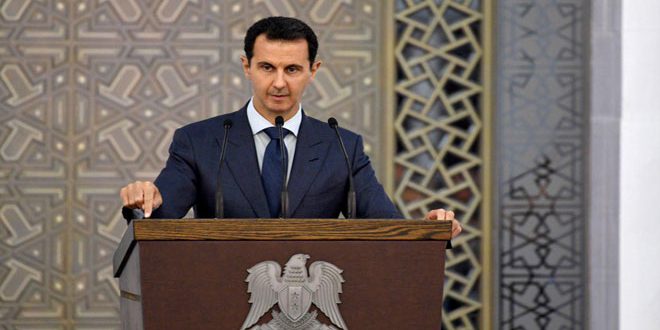Syria, throughout its history, has been a target of those who hold great decision-making control over the Middle East, and who invariably have an important and influential say on the international arena, President Bashar al-Assad told an audience at the Foreign Ministry Conference on Sunday.
In a speech delivered at the opening of the conference, Assad said that the event is an important opportunity for the exchange of expertise and ideas, and a chance to discuss the state’s future policies and propose ideas for the development of the ministry.
The president highlighted the importance of the conference due to the rapidly changing dynamics of events in the world, the region, and Syria in particular.
“Talking about foiling the Western project doesn’t mean we are victorious; the battle is still going on, and the signs of victory are there, but victory itself is another thing,” Assad said.
“The price of resistance is much lower than the price of surrender… we paid a dear price in Syria in this war, but we managed to foil the Western project,” he said, noting that a change in the American position does not reflect a change in policy, adding “the West is like a snake, changing its skin according to the situation.”
The president said that the media and psychological war practiced by the U.S. over the years has not stopped Syria’s fight against terrorism or pushed the nation toward fear. “We struck terrorism since day one, and we will continue to strike it as long as there is a single terrorist in Syria… fighting terrorism is a goal and the basis for any action we take,” he said.
Assad also singled out Turkey for its role in enabling terrorism in Syria, saying: “[President Recep Tayyip] Erdogan is playing the role of political beggar after his support for terrorists was exposed. We don’t consider the Turkish side to be a partner nor a guarantor, nor do we trust it.”
By contrast, the president pointed out, both Russia and China used the right of veto to defend Syria’s unity and the U.N. Charter.
The president affirmed that as long as the fight against terrorism is ongoing, there is no place for a divided Syria, adding that the goal of the Russian-proposed de-escalation zones is to stop bloodshed, deliver humanitarian aid, remove militants and restore security.
Assad said that although the recovery of the economy is slow, it has been consistent, adding that Syria intends to increase communication with the outside market and promote economic opportunities to friendly countries and businesses. “The direct political, economic and military support of our friends made the possibility of advancing on the ground greater and the losses fewer, and these friends are our actual partners,” he said.
The president rejected the idea of security cooperation or the reopening of embassies for hostile states which continue to embrace terrorism inside Syria.
“We will not allow enemies and rivals to achieve through politics what they failed to achieve through terrorism. We must work seriously from now to build the future Syria on solid bases,” he said.
Assad added: “Everything related to the destiny and future of Syria is a 100 percent Syrian issue, and the unity of Syrian territory is self-evident and not up for debate or discussion.”
This article was edited by The Syrian Observer. Responsibility for the information and views set out in this article lies entirely with the author.


